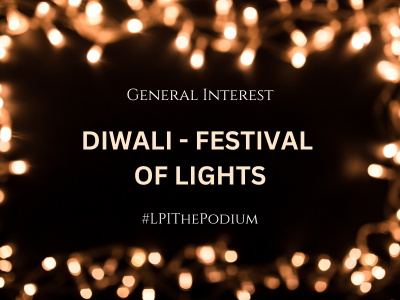
By Christine J. Flores, CBA
Last year, a friend of mine gave me a row of lights which are used during Diwali, so I thought I would research it before I light them. My interest in this holiday has been rekindled by my plans for an upcoming trip to India. So as we approach the holiday – which will be celebrated on November 12 this year – I thought I would check in with my friends, Kodi Dey and her husband Ranjan, regarding the Festival of Lights.
Diwali, also spelled Divali, is one of the major religious festivals in Hinduism, Jainism and Sikhism. It is celebrated throughout India, Singapore and several other South Asian countries as a national holiday. The name is derived from the Sanskrit term dipavali, or “row of lights.” The festival generally symbolizes the victory of light over darkness and good over evil. The lights symbolize the inner light that protects from spiritual darkness, as well as a time of inner illumination. . This festival is as important to Hindus as the Christmas holiday is to Christians.
Observances of Diwali differ depending on region and tradition. In most of India, the celebration lasts five days with the third day being the main celebration of Diwali. There are some areas where Diwali is celebrated only on the main day. The most widespread custom among Hindus is the lighting of diyas, or small earthenware lamps filled with oil to invite the presence of Lakshmi, the goddess of wealth. In North India the festival also celebrates the royal homecoming of Rama to the city of Ayodhya after defeating Ravana, the 10-headed king of the demons. In South India, the festival marks the defeat of the demon Narakasura. Some celebrate this holiday as a commemoration of the marriage of Lakshmi and Vishnu, while others observe it as Lakshami’s birthday.
During this festival, diyas are lit and placed in rows near temples and houses, and set adrift on rivers and streams. Homes are decorated and floors are covered with elaborate designs made of colored rice, sand, or flower petals. The doors and windows of houses are kept open so that Lakshmi can find her way inside and bless the residents with wealth and success.
Each day of Diwali has a specific purpose. The first day is dedicated to cleaning homes and purchasing small gold items and food for the celebration. Lakshmi is the focus of worship on that day. The second day commemorates Krishna’s destruction of Narakasura and it is customary to offer prayers for the souls of ancestors. On the third day families seek blessings from Lakshmi to ensure their prosperity. This is usually the main day of the festival, and candles are lit; and families visit temples. Some believe that fireworks ward off the evil spirits. The fourth day commemorates Krishna’s defeat of Kindra, the king of the gods. This also marks the start of the new year in the Hindu calendar. For some the bond between husband and wife is the theme for the day and husbands will often buy their wives gifts to celebrate. Many perform good deeds, including feeding the poor on this day. The fifth day celebrates the bond between brothers and sisters, and sisters pray for the success and well-being of their brothers. A central theme of this national holiday is family.
Diwali is celebrated by visiting family, exchanging gifts, wearing new clothes, feasting on sweets and special foods, feeding the poor and with fireworks displays. Gambling is encouraged to ensure good luck in the coming year. Businesses are generally closed or close early to allow employees to celebrate Diwali with their families.
In addition to the lights and fun, Diwali is a time to reflect on life and make changes for the upcoming year. Some of the significant practices include:
Give and Forgive. It is common practice that people forget and forgive the wrongs done by others. This gives a spirit of freedom, festivity and friendliness.
Rise and Shine. Waking up during Brahmamuhurta (at 4 a.m. or 1 ½ hours before sunrise) is a great blessing when you consider one’s health, ethical discipline, efficiency at work and spiritual advancement.
Unite and Unify. This holiday is a unifying event, and it is a time when people mingle and embrace one another. It is believed that only a continuous celebration of Diwali can rekindle the need of turning away from the path of hatred.
Prosper and Progress. On this day, Hindu merchants in North India open their new account books and pray for success and prosperity in the coming y ear. People buy new clothes for the family. Employers also purchase new clothes for employees. Homes are cleaned and decorated, and the festival instills charity in the hearts of people who perform good deeds.
Illuminate Your Inner Self. Hindus believe that the light of lights is the one that shines in the chamber of one’s heart. Fixing the mind on this supreme light illuminates the soul and gives an opportunity tocultivate and enjoy eternal bliss.
Information on this colorful holiday is readily available on the internet. Here are three links to get you started if you wish to learn more about it.
https://www.almanac.com/content/diwali
https://www.britannica.com/print/article/166786
Categorized in: General
| << previous | next >> |








